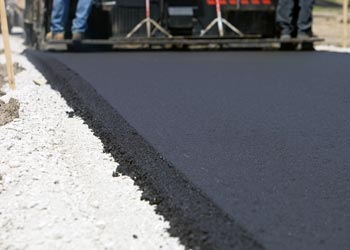Upgrade Your Property's Aesthetic and Capability with Hot Mix Asphalt Paving
Upgrade Your Property's Aesthetic and Capability with Hot Mix Asphalt Paving
Blog Article
Exploring the Ecological Benefits of Warm Mix Asphalt
The use of Warm Mix Asphalt in framework tasks provides an engaging instance for lasting development and ecological stewardship. By delving right into the intricate information of its production procedures and the ingenious usage of recycled products, a deeper understanding arises of just how this innovation surpasses plain surface applications. The ecological advantages of Warm Mix Asphalt prolong much past preliminary perceptions, offering a nuanced point of view on just how this material can lead the way for a greener future.

Lowered Greenhouse Gas Emissions
Warm Mix Asphalt production supplies a substantial decrease in greenhouse gas discharges contrasted to various other pavement products. The production procedure of Warm Mix Asphalt includes warming the mixture of accumulation and asphalt binder to heats. This procedure needs less power compared to the production of different sidewalk products, causing lower greenhouse gas exhausts. Furthermore, using recycled products in Warm Mix Asphalt better adds to reducing its ecological influence. By including reclaimed asphalt sidewalk and recycled asphalt tiles into the mix, the need for virgin products is reduced, leading to energy financial savings and decreased exhausts related to extraction and handling.
Studies have revealed that Warm Mix Asphalt pavements have a smaller sized carbon impact over their life cycle contrasted to other sidewalk options. The toughness and recyclability of Warm Mix Asphalt further improve its ecological advantages by minimizing the need for regular upkeep or replacement, thereby conserving sources and reducing discharges associated with reconstruction activities.
Power Efficiency and Conservation
The manufacturing process of Warm Mix Asphalt not only decreases greenhouse gas discharges yet also contributes considerably to power performance and conservation initiatives. Energy effectiveness is a key benefit of Warm Mix Asphalt production contrasted to other sidewalk types. The toughness of Warm Mix Asphalt reduces the regularity of upkeep and repair, leading to long-term energy savings.
Sustainable Sidewalk Solutions

One key aspect of sustainable pavement services is using recycled materials such as reclaimed asphalt sidewalk (RAP) and recycled asphalt tiles (RAS) By integrating these materials into the asphalt combinations, the demand for virgin sources is decreased, causing lower energy intake and greenhouse gas discharges throughout production. Additionally, the reuse of these products aids divert waste from garbage dumps, adding to an extra circular and sustainable economic situation.
Moreover, sustainable sidewalk services concentrate on enhancing pavement design to improve performance and longevity. Techniques such as warm mix asphalt (WMA) and rock mastic asphalt (SMA) enhance the resilience and resilience of pavements, reducing the demand for constant repair services and substitutes. By carrying out these cutting-edge strategies, infrastructure developers can create sidewalks that not just fulfill high-performance standards but additionally minimize their environmental footprint.
Minimized Environmental Impact
Warm mix asphalt, in specific, provides a number of advantages that contribute to minimizing the general ecological footprint of roadway framework. One vital aspect is the recyclability of asphalt, which can be reused numerous times without compromising its high quality - Regrading.
Moreover, the production of warm mix asphalt gives off lower degrees of greenhouse gases compared to other sidewalk products, making it a more environmentally pleasant option. The energy efficiency of asphalt plants has actually likewise enhanced over the years, bring about reduced fuel intake and reduced exhausts. Furthermore, the smooth surface area of hot mix asphalt minimizes rolling resistance for vehicles, resulting in reduced gas consumption and decreased air contamination from vehicle discharges.
Contribution to Climate Adjustment Mitigation
Warm mix asphalt plays a critical role in mitigating environment modification via its sustainable residential or commercial properties and minimized environmental effect. One considerable payment to climate adjustment reduction originates from the power efficiency of hot mix asphalt production. Compared to other pavement alternatives, the manufacturing procedure for warm mix asphalt eats less energy and discharges lower levels of greenhouse gases, therefore minimizing its total carbon footprint.
In addition, warm mix asphalt's capacity to reflect sunshine, referred to as Related Site albedo, aids in decreasing city warm island effects. By decreasing warmth absorption and retention, hot mix asphalt pavements can reduce the need for air conditioning in city areas, subsequently reducing greenhouse gas emissions associated with energy consumption for cooling down functions.
Additionally, the resilience and recyclability of hot mix asphalt further improve its climate adjustment reduction capabilities. Regrading. The long life-span of asphalt sidewalks reduces the need for constant repair services or replacements, inevitably lowering the carbon exhausts linked to roadway upkeep tasks. The recyclability of asphalt products lessens the demand for virgin resources and reduces the environmental effect of sidewalk building, lining up with lasting Recommended Reading practices for climate modification reduction.
Verdict
In verdict, the environmental advantages of Hot Mix Asphalt demonstrate its significant contribution to reducing greenhouse gas exhausts, conserving power, and minimizing environmental effect. This lasting pavement option straightens with climate modification mitigation initiatives, advertises resource preservation, and enhances framework growth. By utilizing recycled materials, energy-efficient manufacturing processes, and durable design, Warm Mix Asphalt plays a critical role in cultivating a more eco-friendly method to facilities building.
The manufacturing process of Hot Mix Asphalt includes heating up the mix of aggregate and asphalt binder to high temperature levels. By incorporating reclaimed asphalt pavement and recycled asphalt roof shingles into the mix, the demand for virgin materials is minimized, leading to energy savings and reduced emissions connected with removal and handling.
One key facet of sustainable sidewalk services is the check usage of recycled materials such as redeemed asphalt sidewalk (RAP) and recycled asphalt shingles (RAS) Methods such as warm mix asphalt (WMA) and stone mastic asphalt (SMA) boost the longevity and resilience of sidewalks, lowering the requirement for regular repair work and substitutes. Contrasted to other pavement alternatives, the production process for hot mix asphalt takes in much less energy and emits reduced levels of greenhouse gases, therefore lowering its overall carbon impact.
Report this page